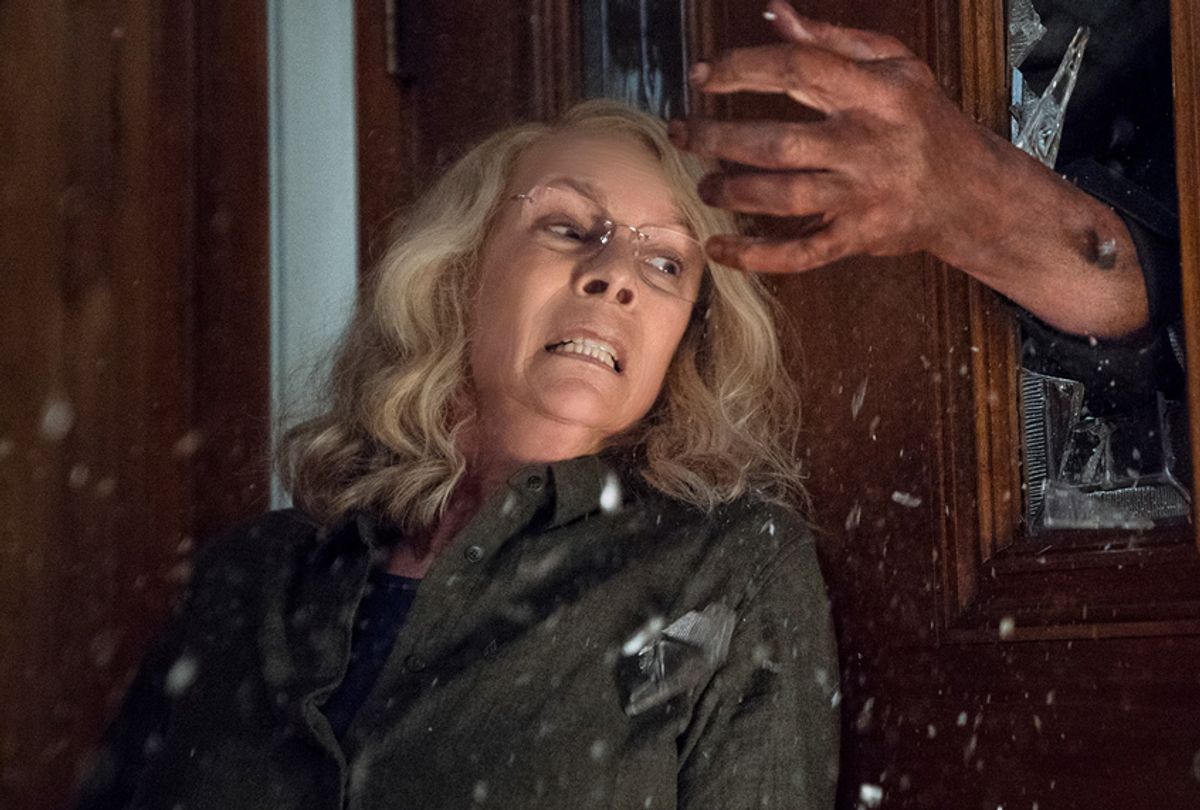After watching "Halloween," I spoke with Brad Jones (better known to horror fans, and film buffs in general, as The Cinema Snob) about how this particular movie fits into the convoluted continuity of the broader "Halloween" universe. His observation stuck with me as I wrote this review: When discussing his own preferences among the "Halloween" films, he mused that if he had to offer recommendations, "even though this one knocks 'Halloween II' out of continuity, watch one and two and then this one."
It's a shame that the 1981 "Halloween II" had to be retconned for this movie to work, but the fact that that happened underscores a more important point about what makes the 2018 "Halloween" so effective. While the initial sequel to the 1978 classic is a masterpiece on its own terms, the decision to reveal that survivor girl Laurie Strode was the secret sister of slasher villain Michael Myers added a contrived, soap opera-esque element to the series that directly undermined the quality which made the first film such a milestone — namely, that the slasher villain was pure evil, with no discernible motive, worldview or personality. Giving him a backstory beyond the fact that he has always liked to kill transformed his character in a fundamental way; instead of being an inexplicable force of evil, he became yet another horror icon with a complicated mythology.
The decision to retcon Myers' relationship with Strode is the first of many details that the new "Halloween" gets right. Set 40 years after the events of the original film, and ignoring every sequel that followed it, "Halloween" begins with showing Strode (a brilliant Jamie Lee Curtis reprising her role) as an emotionally unstable survivalist still deeply affected by the killing rampage wrought by Myers (Nick Castle and James Jude Courtney) when she was a teenager. The plot is set in motion when Myers escapes while being transferred to a new prison, putting psychiatrist Dr. Ranbir Sartain (Haluk Bilginer) and police officer Frank Hawkins (Will Patton) in hot pursuit while Strode attempts to protect her daughter Karen (Judy Greer), son-in-law Ray (Toby Huss) and granddaughter Allyson (Andi Matichak) while ridding the world of Myers once and for all.
There are a number of things that this movie does right with this premise. The first is that it nails the death scenes, which are memorable in all the right ways (building tension through the camera work, making audience members cringe at specific kills, searing our memories with aftermath shots). The second, and in my mind most impressive, was how it made Strode's struggle into something more than the sum of its parts. While many horror films use their protagonists' lingering trauma as a way of creating superficial conflict, "Halloween" actually uses Strode's PTSD to explore deeper social issues. When Strode is told that she needs to "just get over" her past, the victim-blaming and lack of empathy are something that anyone who struggles with the demons of their past can relate to. As a result, when her warnings of impending doom and general paranoia are proved right, it feels like more than just a standard horror victory. It's a vindication, a triumph of the human spirit, and feels earned.
This isn't to say that the new "Halloween" is without flaws. Some characters make dumb decisions that were clearly written into the script to increase the body count, while others are so bland that their disposability is likewise immediately apparent. One character romantically betrays another in a plot thread that builds and builds before being abruptly dropped and forgotten. Most frustrating is the trajectory of Dr. Sartain, which threatens a bold new twist for the series but resolves itself too quickly, rendering what could have been a significant choice by his character particularly pointless.
These are minor quibbles, though, in a film that ultimately does what none of the other sequels in the "Halloween" franchise have managed to accomplish. (1982's "Halloween III: Season of the Witch" isn't included here because it doesn't have Myers in it). The 1981 "Halloween II" works exceptionally well as a fast-paced and brazenly gruesome '80s slasher flick, but it has the aforementioned flaw of robbing Myers of some of his mystery. The two timelines that were built off of that pair of films both failed, at least in part, because they now had no choice but to further develop a Michael Myers backstory. The fourth, fifth and sixth movies, which comprised the first timeline, all added increasingly absurd plot points about his genealogy until it reached the point where we learned that Myers was a mere drone being controlled by an ancient cult that forced him to murder his family members. The films in the second timeline, which included 1998's "Halloween H20: 20 Years Later" and 2002's "Halloween: Resurrection," were merely bland and incompetent, with their worst offense being the anticlimactic send-off that series gave to the Strode character. And while I am a big fan of the gritty universe in Rob Zombie's remake series, which included 2007's "Halloween" and 2009's "Halloween II," I will be the first to admit that they work better as entries into Zombie's own bizarre cinematic oeuvre than as legitimate Michael Myers stories.
In other words, like Jones, I agree that this is the best Michael Myers-based "Halloween" movie since 1981's "Halloween II." While it lacks the flair of that first sequel, and I suspect won't hold up as well upon repeated viewings for that reason, it does a much better job of carrying on the spirit of the original movie. If you're new to the "Halloween" series, you can walk into this one and have a good time, and if you are a fan, it won't insult your intelligence.

Shares